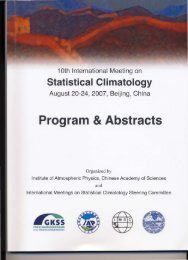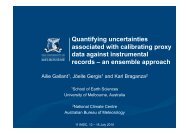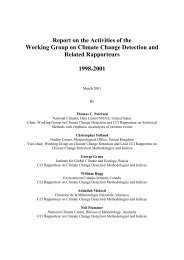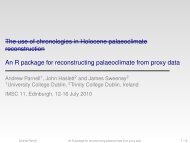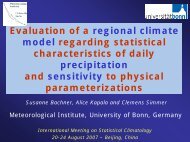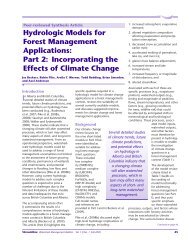The tenth IMSC, Beijing, China, 2007 - International Meetings on ...
The tenth IMSC, Beijing, China, 2007 - International Meetings on ...
The tenth IMSC, Beijing, China, 2007 - International Meetings on ...
Create successful ePaper yourself
Turn your PDF publications into a flip-book with our unique Google optimized e-Paper software.
Invited Sessi<strong>on</strong>: Spatial patterns of climate<br />
Reduced Space Approach to Objective Analyses of Historical Climate Data Sets: Progress and<br />
Problems<br />
Speaker: Alexey Kaplan<br />
Alexey Kaplan<br />
Lam<strong>on</strong>t-Doherty Earth Observatory of Columbia University<br />
alexeyk@ldeo.columbia.edu<br />
Observed historical climate fields are characterized by comparatively precise data and<br />
good coverage in the last few decades and poor observati<strong>on</strong>al coverage in the earlier period.<br />
<str<strong>on</strong>g>The</str<strong>on</strong>g> technique of the reduced space objective analysis of such fields (i.e. estimating them in<br />
projecti<strong>on</strong>s <strong>on</strong>to a low-dimensi<strong>on</strong>al space spanned by the leading patterns of the signal<br />
variability) is presented in the c<strong>on</strong>text of more traditi<strong>on</strong>al approaches to objective data analysis.<br />
Various versi<strong>on</strong>s of space reducti<strong>on</strong> and covariance estimati<strong>on</strong> techniques are reviewed.<br />
Outstanding problems and possible ways to overcome them are discussed.<br />
Challenges of regi<strong>on</strong>al climate modeling and validati<strong>on</strong><br />
Speaker: Douglas Nychka<br />
Douglas Nychka, ari Kaufman, Stephen Sain and Linda Mearns<br />
Nati<strong>on</strong>al Center for Atmospheric Research, PO Box 3000, Boulder, CO 80307-3000<br />
nychka@ucar.edu<br />
As attenti<strong>on</strong> shifts from broad global summaries of climate change to more specific<br />
regi<strong>on</strong>al results there is a need for statistics to analyze observati<strong>on</strong>s and model output that<br />
have significant variability and also to quantify the uncertainty in regi<strong>on</strong>al projecti<strong>on</strong>s. This talk<br />
will survey some work <strong>on</strong> interpreting regi<strong>on</strong>al climate experiments. In large multi-model<br />
studies <strong>on</strong>e challenge is to understand the c<strong>on</strong>tributi<strong>on</strong>s of different global and regi<strong>on</strong>al model<br />
combinati<strong>on</strong>s to the simulated climate. This is difficult because the runs tend to be short in<br />
length and with a limited number of ensemble members. We suggest some spatial models for<br />
the climate fields based <strong>on</strong> sparse approximati<strong>on</strong>s to the covariance matrix and derive an AN<br />
OVA like decompositi<strong>on</strong> for the fields. <str<strong>on</strong>g>The</str<strong>on</strong>g> decompositi<strong>on</strong> into main effects and interacti<strong>on</strong>s<br />
helps to isolate the effects of different models. <str<strong>on</strong>g>The</str<strong>on</strong>g> spatial models provide a rigorous<br />
framework for assessing statistical significance and comparing simulati<strong>on</strong>s to observed<br />
climate. This approach is illustrated for output from the PRUDENCE program and we also<br />
discuss the newer NARCCAP experiments for regi<strong>on</strong>al climate of North America.<br />
1



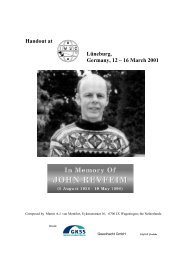
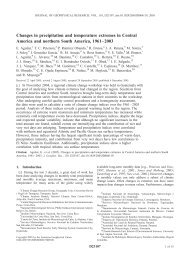
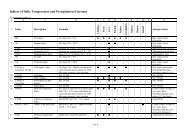
![final_program_abstracts[1]](https://img.yumpu.com/19102520/1/174x260/final-program-abstracts1.jpg?quality=85)
